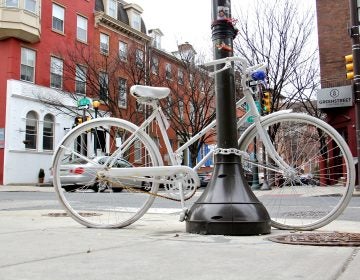Philadelphia drivers rarely prosecuted for crashes that kill pedestrians, cyclists
Only a fraction of drivers in crashes that kill pedestrians, bicyclists and motorcyclists ever face serious criminal charges.

Cars regularly stop in Philadelphia's bike lanes that aren't "protected" by delineator posts. (Emma Lee/WHYY)
Only a fraction of drivers in crashes that kill pedestrians, bicyclists and motorcyclists ever face serious criminal charges, according to a new analysis by the Bicycle Coalition of Greater Philadelphia.
About 100 people die in motor vehicle-related crashes annually in Philadelphia. Nearly 50 percent of the deaths are cyclists and pedestrians, according to the coalition. The advocacy organization examined 95 crash fatalities that occurred in 2017 and 2018 and found that just 16 percent of the drivers were charged with a felony.
Sarah Clark Stuart, executive director of the Bicycle Coalition, said the organization decided to look into how many drivers in fatal crashes are prosecuted after the driver who hit 11-year-old Julian Angelucci wasn’t charged for the accident.
“It was a way for us to better understand how those involved in these kinds of crashes, how the law is applied to bring justice for those families,” Clark Stuart said.
The 95 cases analyzed represent a sample of Philadelphia crash fatalities. The analysis did not include the total number of deadly crashes in 2017 and 2018 because the Philadelphia Police Department didn’t have the resources to provide information on every case, according to the Bicycle Coalition.
Clark Stuart said the more her team delved into the 95 cases shared with the coalition, the clearer it became that there is no easy way to track crash investigations or their results.
The analysis found that for 46 percent of the cases examined, there is no information on the status of the investigation or whether charges were filed.
A database that lists the status of investigations and their outcomes is high on the list of the group’s demands. Clark Stuart said such a record is essential for transparency and to send a message about the law.
“Knowing the degree to which the law is being effectively and aggressively pursued just helps people understand that consequences will occur when these crashes happen,” she said.
A database, she argues, would also be a way to see if city efforts to make streets safer, such as the Vision Zero Action Plan, are working, and help people understand how efforts could be improved.
Other items on the wish list include additional accident reconstruction training for at least one member of the police department’s Accident Investigative Unit.
The Bicycle Coalition, Families for Safe Streets Greater Philadelphia, and the Vision Zero Alliance are also asking for $30,000 for software that will aid police investigations and a traffic violence liaison within the district attorney’s Philadelphia CARES program, which provides support to the families of victims of homicide.
Ben Waxman, a spokesman for the district attorney’s office, said using CARES staff to respond to a traffic death is an interesting concept that’s under discussion at the agency.
He said two cases in the report listed as not resulting in charges are actually still under investigation.
Clark Stuart said this proves there isn’t a single point of information at the moment.
“We strongly believe that the DA’s office has a responsibility to do what it can to hold drivers accountable when they commit crimes behind the wheel,” Waxman said.
The office tracks charges from fatal crashes as a whole. It doesn’t differentiate pedestrians, cyclists and motorcyclists from other motorists killed.
Forty-five people total were charged with homicide by vehicle in the two years the report covered, Waxman said. The office also charged 153 people with accidents involving death or personal injury, for the same period.
WHYY is your source for fact-based, in-depth journalism and information. As a nonprofit organization, we rely on financial support from readers like you. Please give today.







